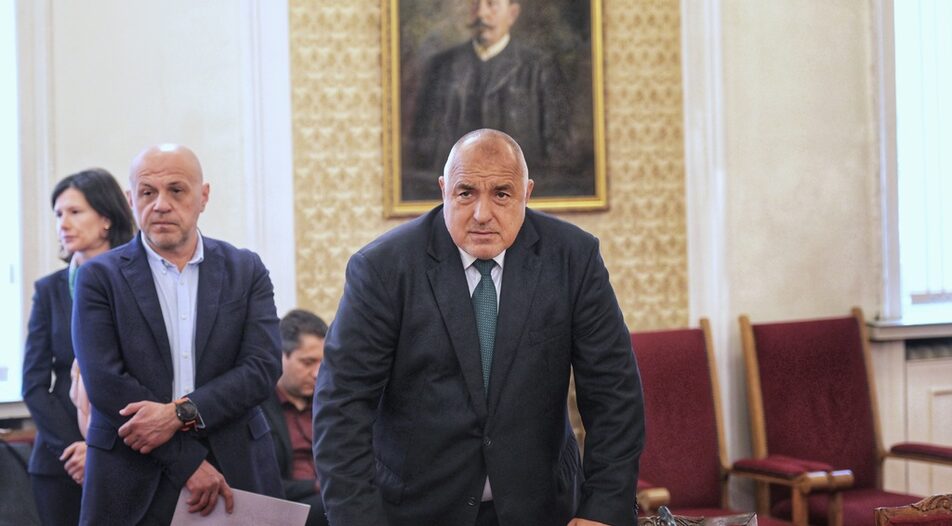"Our minimum program is to agree on a budget, to pass the laws [required for the next Recovery Plan tranche - editor's note] and only then to go to elections and start all over again. The maximum program is to form one good political, expert government."
This was GERB chairman Boyko Borissov's appraisal of a meeting held with the reformist coalition We Continue the Change - Democratic Bulgaria (WCC-DB) on Tuesday, where they discussed a common governance program and probed a possible cabinet that both factions could support.
While Tuesday's meeting felt like a ceasefire between the two leading parties, it is too early to call it a breakthrough - both sides seem to be dancing around each other, expecting the others to budge. On the one hand, GERB shows a clear willingness to compromise - including potentially backing some form of a WCC-DB minority cabinet - to get a (semi-)stable government rolling. On the other hand, WCC-DB still insist on keeping their promise not to back any form of a GERB-nominated government, which means that the reformist faction has to propose an alternative solution that works for the winner, too.
Who backs who
GERB's potential willingness to pass WCC-DB the right to form a cabinet with the second mandate is not a blank check - Mr Borissov said he insists that his party sees who the reformists are planning to nominate as ministers before giving them support. WCC-DB's Assen Vassilev, however, sent the ball back to the GERB leader, saying that it is the winner's duty to exhaust the first mandate first.
"It's unconventional to ask the second power to propose cabinet members at this stage," Mr Vassilev said, adding that, for the negotiations to advance, they have to start from the establishment of a legislative program acceptable to both sides. "The situation is unconventional, therefore the proposals are unconventional and the solutions are unconventional," Mr Borissov countered.
What comes next?
The meeting saw two key breakthroughs. First, leaders of the two factions reaffirmed their position on the adoption of the bills from the common legislative programme, which was agreed at the beginning of the parliament's work.
These include the adoption of several bills linked to the National Recovery and Sustainability Plan, Bulgaria's accession to Schengen and the euro area, as well as changes to the law on money laundering, the Insurance Code and the anti-corruption law. Additionally, they agreed to approve some kind of oversight over the work of the Prosecutor General. The next question is whether the two factions would be able to agree on a timeline and assurance mechanisms that all those key changes would pass.
Fixing the caretaker budget
Second, the two formations agreed to appoint a joint working group to discuss the draft state budget proposed by the caretaker cabinet together with representatives of the Finance Ministry. Matters came to a head last week when caretaker PM Galab Donev and Finance Minister Rositsa Velkova proposed a budget with a record-high deficit of 6.4% of GDP and a need for new debt of 13.7 billion levs for 2023. This happened because the parliamentary parties did not support the caretaker cabinet's ideas for changes in the tax legislation that would have allowed levying a tax on excess profit and eliminating the differentiated VAT treatment of some sectors.
Both GERB and WCC-DB declared their readiness to nominate a working group to talk with representatives of the finance ministry about the planned budget, which might mark Bulgaria as fiscally undisciplined and jeopardise its bid to join the euro. "Our priorities are a 3% deficit, cutting spending, borrowing, but let's do it together, responsibly, and not leave any bad things for Bulgaria," Mr Borissov said during the meeting with WCC-DB. This contradicted his immediate post-election statement that GERB would not vote on the state budget unless a regular government was voted in.
It is doubtful whether the two factions can agree an approach to the budget. WCC's Assen Vassilev claims the large deficit is based on poor estimations by the Finance Ministry, which can be technically fixed, while GERB's Tomislav Donchev favors significant spending cuts. So the budget - which might have served as a bridge between the two factions - could prematurely scupper any possible collaboration.
"Our minimum program is to agree on a budget, to pass the laws [required for the next Recovery Plan tranche - editor's note] and only then to go to elections and start all over again. The maximum program is to form one good political, expert government."
This was GERB chairman Boyko Borissov's appraisal of a meeting held with the reformist coalition We Continue the Change - Democratic Bulgaria (WCC-DB) on Tuesday, where they discussed a common governance program and probed a possible cabinet that both factions could support.












